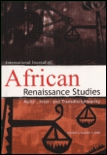
International Journal of African Renaissance Studies
Scope & Guideline
Celebrating the Vibrancy of African Literature and Arts
Introduction
Aims and Scopes
- Interdisciplinary Research:
The journal encourages interdisciplinary approaches that combine insights from history, sociology, political science, and cultural studies to understand complex African realities. - Afrocentric Paradigms:
A core focus of the journal is to emphasize Afrocentric perspectives, challenging Eurocentric narratives and exploring indigenous knowledge systems and philosophies. - Socio-Political Analysis:
The journal often addresses socio-political issues, including governance, conflict resolution, and nation-building, particularly in the context of post-colonial Africa. - Cultural Studies and Identity:
Exploration of cultural identity, nationalism, and the role of art and literature in shaping contemporary African societies is a significant area of study. - Economic Development and Globalization:
The journal critically examines the effects of globalization on African economies, including trade relationships and local development strategies. - Gender and Social Justice:
The journal includes discussions on gender dynamics, social justice, and the role of women in Africa's socio-political landscape.
Trending and Emerging
- Regional Integration and Trade Dynamics:
There is an increasing focus on topics related to regional organizations, trade agreements like the AfCFTA, and their implications for intra-African trade and cooperation. - Peacebuilding and Conflict Resolution:
Emerging discussions on peacebuilding mechanisms, particularly in conflict-affected regions, demonstrate a growing interest in practical solutions to enhance stability in Africa. - Indigenous Knowledge and Practices:
A trend towards valuing indigenous knowledge systems is evident, with scholars exploring how these can inform contemporary governance and community practices. - Digital Transformation and Governance:
The impact of digital technology on governance, elections, and civic engagement is gaining traction, reflecting global trends in digitalization and its implications for African states. - Cultural Renaissance and Identity Formation:
There is a notable increase in exploring cultural renaissance movements and how they contribute to identity formation and national consciousness in various African contexts.
Declining or Waning
- Traditional Political History:
There appears to be a waning interest in conventional political history narratives, as scholars shift towards more contemporary issues and dynamic socio-political analyses. - Colonial Legacy Studies:
Research specifically focused on the colonial past and its direct implications has decreased, possibly in favor of exploring more current challenges and future-oriented discussions. - Environmental Studies:
Although still relevant, the frequency of papers specifically addressing environmental issues and ecological studies has diminished, suggesting a shift towards socio-economic themes. - Theoretical Constructs in African Studies:
Discussions centered on abstract theoretical frameworks without direct application to current African realities are becoming less prominent, indicating a preference for practical, actionable research.
Similar Journals
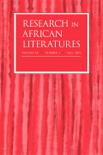
RESEARCH IN AFRICAN LITERATURES
Advancing Critical Discourse in African LiteraturesRESEARCH IN AFRICAN LITERATURES is a prestigious peer-reviewed journal published by Indiana University Press, dedicated to the critical exploration of African literary traditions, cultures, and texts. With an ISSN of 0034-5210 and an E-ISSN of 1527-2044, this journal stands out in the field of literature and literary theory, currently ranking in the 80th percentile of its category according to Scopus, making it a significant platform for scholars and researchers alike. Since its establishment, the journal has evolved through converged volumes from 2002 to 2024, consistently fostering innovative discourse and interdisciplinary approaches that illuminate the complexities of African narratives. Although it does not offer open access, the journal is integral for anyone engaged in African studies, providing critical insights that are essential for understanding the broader implications of literature within diverse cultural contexts. The journal's commitment to high standards of scholarship is reflected in its Q3 quartile ranking and its influential contribution to contemporary literary dialogue.
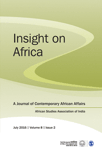
Insight on Africa
Illuminating Africa's Multidisciplinary NarrativesInsight on Africa is a distinctive academic journal published by SAGE Publications Ltd, focusing on the multidisciplinary aspects of African studies, including facets of development, history, and political science. With its ISSN 0975-0878 and E-ISSN 0976-3465, this journal serves as a vital resource for researchers, professionals, and students interested in the continent’s socio-political dynamics and historical contexts. Enjoying a reputable Q1 ranking in History and Q3 rankings in Development and Political Science and International Relations, Insight on Africa not only reflects a significant impact in its fields but also aims to foster scholarly discussions and promote knowledge dissemination related to contemporary African issues. While not an open-access journal, its commitment to rigorous academic standards and peer-reviewed content ensures that published research achieves broad recognition, making it essential reading for those engaged in African studies.
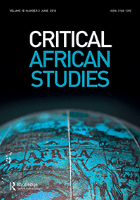
Critical African Studies
Challenging Perspectives, Shaping FuturesCritical African Studies, published by TAYLOR & FRANCIS LTD, is a premier journal dedicated to advancing the discourse on critical issues affecting Africa and its diaspora. With an ISSN of 2168-1392 and an E-ISSN of 2040-7211, this journal has established itself as a leading publication in the field of Arts and Humanities, ranked Q1 in Arts and Humanities (miscellaneous) and Q2 in Social Sciences (miscellaneous) as of 2023, showcasing its commitment to high-quality research. Over its converged years from 2015 to 2024, it has become a critical platform for scholars and practitioners to explore diverse perspectives, innovative ideas, and multidisciplinary approaches to issues such as social justice, governance, and cultural narratives within the African context. The journal's Scopus rankings reflect its significant impact, with impressive placements in both the Arts and Humanities and Social Sciences categories. Critical African Studies aims to foster a robust dialogue among researchers, professionals, and students, making it essential reading for anyone interested in the complexities of Africa's socio-political landscape and cultural heritage.
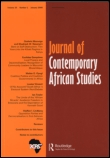
Journal of Contemporary African Studies
Fostering critical dialogue on contemporary African issues.The Journal of Contemporary African Studies, published by Routledge Journals, Taylor & Francis Ltd, is a premier academic journal dedicated to advancing the understanding of social, economic, and political developments across Africa. Since its inception in 1981, the journal has served as a crucial platform for scholars, researchers, and practitioners to disseminate innovative research and critical discourse within the realms of Development, Geography, and Political Science. Ranked in the Q2 category for several disciplines, including Development and Geography in 2023, it occupies a significant role in informing policy and fostering global dialogue around African studies. With its commitment to rigorous scholarship and the promotion of diverse voices, the journal continues to shape debates in contemporary Africa, making it an indispensable resource for anyone invested in the continent's future. Accessible through various academic databases, the journal is poised to reach a wide audience committed to fostering impactful research and insights in African contexts.
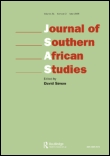
JOURNAL OF SOUTHERN AFRICAN STUDIES
Advancing Knowledge on Southern Africa's Cultural LandscapeThe JOURNAL OF SOUTHERN AFRICAN STUDIES, published by Routledge Journals, Taylor & Francis Ltd, is a premier scholarly outlet dedicated to the exploration and analysis of social, political, and cultural dynamics affecting the Southern African region. With an established history since 1974, this journal features articles that contribute significantly to various disciplines, including Arts and Humanities, Sociology, and Geography, and is recognized within its fields as evidenced by its Q2 and Q3 quartile rankings in the latest assessments. Offering a rich academic platform for researchers, professionals, and students, it fosters interdisciplinary approaches and welcomes critical discourse on contemporary issues, ensuring relevance and impact in today's rapidly changing socio-political landscape. Notably, the journal has achieved commendable rankings on Scopus, affirming its standing as an influential source of knowledge. Although not open access, it remains a vital resource for those seeking to deepen their understanding of Southern Africa and its global implications.
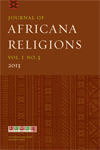
Journal of Africana Religions
Exploring the Depths of Africana SpiritualityJournal of Africana Religions, published by Penn State University Press, serves as a vital platform for scholarly discourse in the fields of Anthropology, Cultural Studies, and Religious Studies. This peer-reviewed journal, operating since 2017, provides a rigorous examination of the diverse religious traditions and practices within the African diaspora. With an H-index that reflects the journal’s growing impact, it currently holds a Q3 ranking in Anthropology and Q2 rankings in both Cultural Studies and Religious Studies, indicating its esteemed position in contemporary academia. Its inclusion in the Scopus rankings further reinforces its relevance, notably with a 75th percentile placement in Religious Studies. While not an open-access journal, the Journal of Africana Religions remains committed to presenting high-quality research that enriches understanding of Africana religious practices, engages with pressing cultural issues, and fosters interdisciplinary dialogue. This makes it an essential resource for researchers, professionals, and students aiming to deepen their knowledge and contribute to ongoing discussions in these dynamic fields.

CAHIERS D ETUDES AFRICAINES
Diving Deep into the Socioeconomic and Cultural Dimensions of AfricaCAHIERS D ETUDES AFRICAINES (ISSN: 0008-0055, E-ISSN: 1777-5353) is a distinguished academic journal published by EDITIONS ECOLE HAUTESETUDES & SCIENCES SOCIALES, based in France. With a rich history since its inception in 1975, this journal provides an invaluable platform for scholarly discourse in the fields of African studies, history, and social sciences. Despite being classified in the Q4 quartile for Development and Geography, Planning and Development, it holds a notable Q2 designation in History, catering to an audience that challenges conventional narratives and seeks to deepen their understanding of the African continent's multifaceted historical and contemporary issues. Although not currently open access, the journal remains an essential resource for researchers, professionals, and students dedicated to advancing knowledge and promoting meaningful discussions around African studies. With the scope spanning various dimensions of socioeconomic and cultural development, CAHIERS D ETUDES AFRICAINES consistently engages a diverse readership keen on exploring and contributing to the understanding of Africa's role in global contexts.

Politikon
Illuminating Contemporary Issues in Politics and SocietyPolitikon is a prestigious journal published by Routledge Journals, Taylor & Francis Ltd, focusing on the dynamic fields of Political Science and International Relations as well as Sociology. With an impressive history dating back to 1974, the journal has established itself as a significant contributor to scholarly discourse, reflected in its 2023 categorization within Q2 quartiles in both the Political Science and International Relations category and the Sociology and Political Science category. Although Open Access options are not currently available, Politikon provides valuable insights and rigorous research that are instrumental for academics, practitioners, and students alike. The journal has also achieved notable Scopus rankings, showcasing its relevance in the social sciences arena. By exploring contemporary political issues and sociopolitical phenomena, Politikon continues to be a vital resource for those seeking to understand the complexities of governance, policy-making, and societal dynamics on a global scale.

Annee du Maghreb
Bridging Cultures: A Platform for Maghreb StudiesAnnée du Maghreb, published by CNRS Éditions, is an esteemed open-access journal dedicated to advancing the study of Mediterranean and North African cultures, history, and societies. Since its inception in 2004, the journal has aimed to foster a deeper understanding of the complex socio-political dynamics, artistic expressions, and historical contexts of the Maghreb region. By providing a platform for rigorous research and interdisciplinary dialogue, Année du Maghreb plays a pivotal role in enriching academic discourse and enhancing knowledge within the fields of anthropology, history, and cultural studies. Accessible to a global audience, this journal invites researchers, professionals, and students to contribute to its growing repository of scholarly work, ensuring the continuation of high-quality discussions pertinent to this vibrant area of study.

Safundi
Advancing Scholarship at the Intersection of CulturesSafundi, published by Routledge Journals, Taylor & Francis Ltd, is a distinguished peer-reviewed journal dedicated to exploring the intersections of culture, history, and political science. Since its inception in 2000, Safundi has contributed significantly to the discourse on cultural studies, positioning itself as a vital resource for researchers and professionals alike. With an Impact Factor reflective of its rigorous scholarship, the journal is ranked in the top quartiles for cultural studies and history, showcasing its influence and authority within these fields. The journal addresses critical contemporary issues, aiming to foster a nuanced understanding of cultural dynamics and historical contexts. While access options are traditional, Safundi remains committed to disseminating pivotal research that resonates with academics and policymakers. As it continues to evolve through to 2024, Safundi serves as an indispensable platform for students and scholars seeking to contribute to the vibrant dialogue surrounding culture and its implications in our global society.